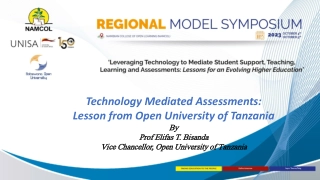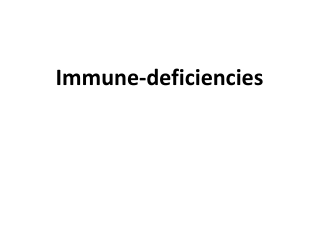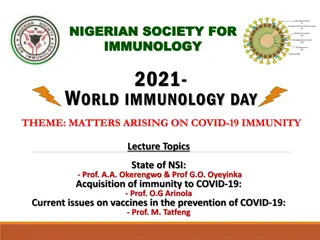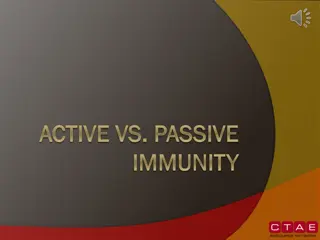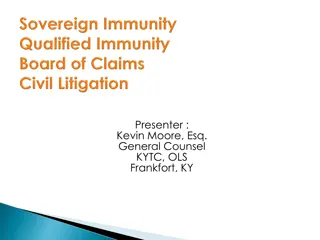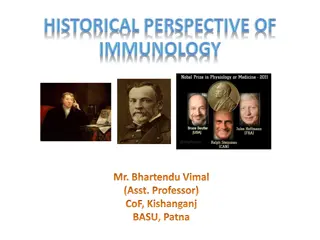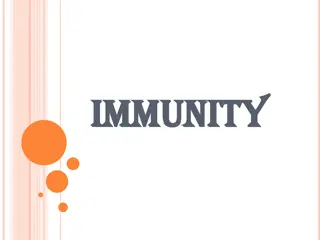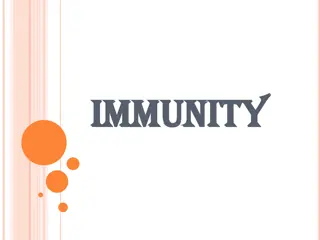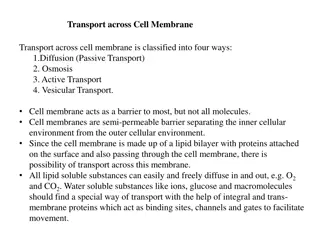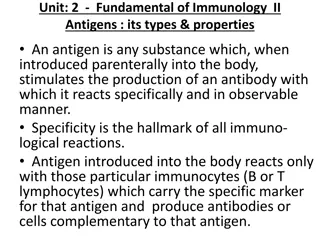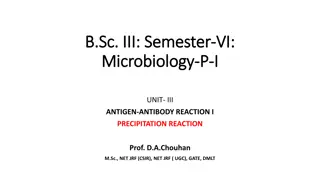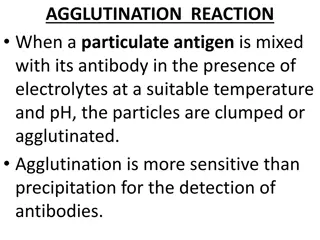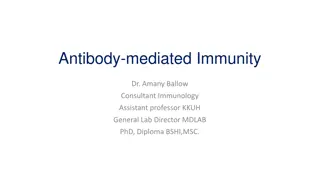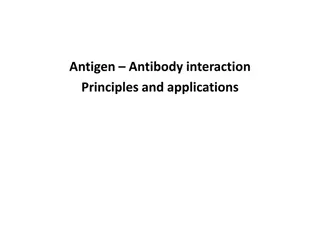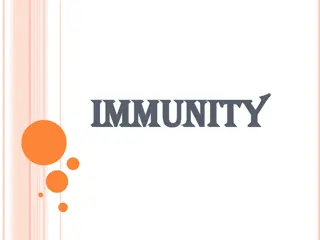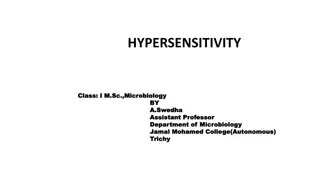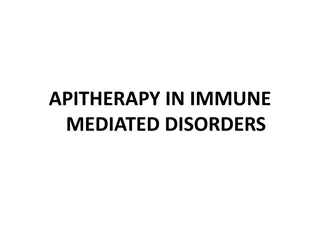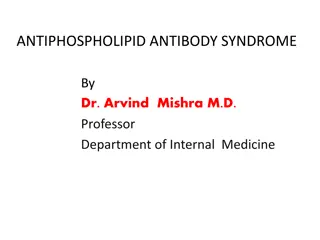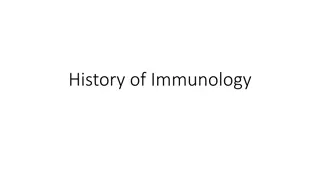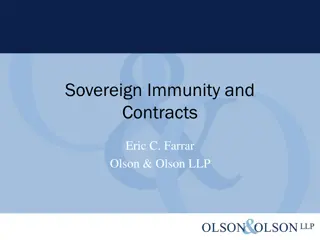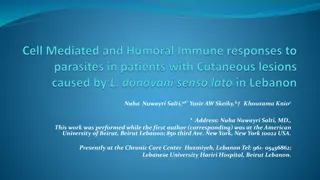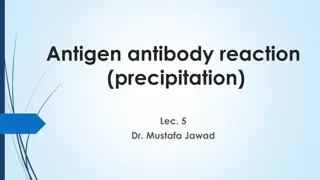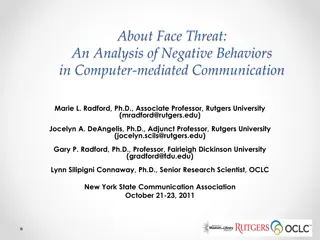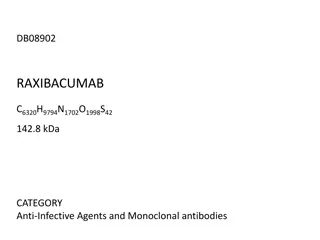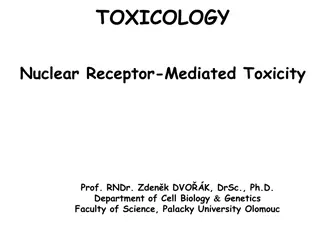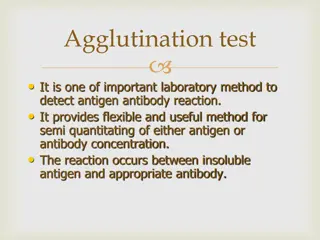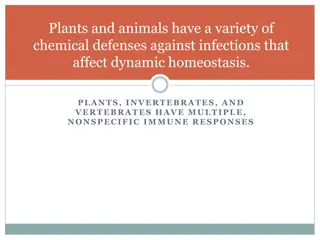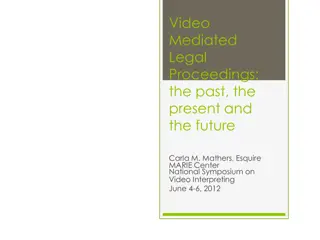Technology Mediated Assessments
Discover how the Open University of Tanzania revolutionized traditional assessments using technology, reducing costs, enhancing security, and increasing efficiency. From the implementation of technology-mediated assessments to the secure management of exam processes, explore their innovative approac
0 views • 32 slides
Immune-deficiencies
Immune deficiencies can be classified into primary hereditary disorders based on clinical presentations, including cell-mediated, antibody-mediated, non-specific, and complement activation deficiencies. Major clinical manifestations of immune disorders range from B-cell deficiencies to phagocytic ce
2 views • 46 slides
Understanding Vaccines and Immunization
Explore the world of vaccines and immunization, learning about active and passive immunity, childhood and adult immunization schedules, common vaccines, contraindications, adverse effects, and the importance of immunization in preventing diseases. Discover the process of immunization and how it stim
2 views • 27 slides
Targeting human exosomes via bispecific antibody platform
Explore the potential of targeting human exosomes using a bispecific antibody platform, enhancing drug delivery capabilities. The study delves into engineering exosomes as drug carriers, developing exosome targeting antibodies (ExTAbs), and verifying exosome delivery efficiency. Future directions in
7 views • 12 slides
Insights on COVID-19 Immunity and Vaccines: NSI 2021 Lecture Highlights
Delve into the cutting-edge discussions from the Nigerian Society for Immunology's 2021 World Immunology Day event, featuring lectures on the state of NSI, acquisition of immunity to COVID-19, and current vaccine issues. Learn about the structural proteins of the SARS-CoV-2 virus, the importance of
4 views • 46 slides
Understanding Active vs. Passive Immunity for Better Health
Immunity is the body's defense mechanism against diseases. Active immunity occurs through exposure to antigens, either naturally during infection or artificially through vaccines. It leads to the production of memory cells for long-lasting protection. On the other hand, passive immunity involves rec
0 views • 17 slides
Legal Immunity and Liability in Kentucky State
Analysis of legal principles regarding immunity and liability in the Commonwealth of Kentucky, including factors such as public immunity, official immunity, and governmental employee liability. The content discusses scenarios where immunity may apply and exceptions where personal liability can be im
0 views • 7 slides
Overview of Immunology: From Historical Perspectives to Modern Techniques
Immunology is the study of the immune system, its functions, and responses to various stimuli. The field traces back to ancient times, with historical figures like Thucydides and Edward Jenner contributing to its development. From innate immunity to adaptive responses, the immune system plays a cruc
0 views • 29 slides
Understanding Acquired Immunity and Its Types
Acquired immunity, also known as adaptive immunity, is the resistance developed by an individual to foreign molecules. It involves antigenic specificity, diversity, immunologic memory, and self/non-self recognition. The two main types of acquired immunity are active immunity, developed from antigeni
3 views • 17 slides
Understanding Immunity: Types and Importance in Health
Immunity is the body's defense system against pathogens, consisting of innate and acquired types. Species immunity offers resistance at a species level, while innate immunity provides the initial defense mechanism. Acquired immunity can be active or passive, providing specific protection to individu
0 views • 17 slides
Understanding Cell Membrane Transport: Diffusion and Facilitated Diffusion
Cell membrane transport plays a crucial role in maintaining cellular functions by regulating the movement of substances across the membrane. Diffusion, a passive transport process, allows molecules to move from areas of high concentration to low concentration without energy expenditure. Within diffu
2 views • 20 slides
Understanding the Importance of Immunity in Reporting Laws
Immunity in reporting laws is a critical harm reduction measure that allows sex workers, trafficking survivors, and certain crime witnesses to report incidents to police without facing arrest or charges. By providing immunity, advocates aim to mitigate the harms of anti-prostitution laws, facilitate
0 views • 6 slides
Understanding Antigens and Immunogens: Types and Properties
Antigens are substances that stimulate the production of antibodies in the body, exhibiting specificity in immune reactions. They interact with immune response products like antibodies, BCRs, and TCRs. Immunogens induce detectable immune responses, leading to antibody production or T cell activation
1 views • 30 slides
Immunology Testing in Pernicious Anaemia: A Quick Guide
The article by Dr. Charu, a Consultant Immunologist, provides insights into immunology testing for Pernicious Anaemia (PA). It covers considerations for PA diagnosis, prevalence data, and details intrinsic factor antibody and gastric parietal cell antibody tests. Guidelines for diagnosis and treatme
0 views • 9 slides
Understanding Antigen-Antibody Precipitation Reaction in Microbiology
Antigen-antibody precipitation reaction involves the formation of insoluble products when a soluble bivalent antibody interacts with a soluble antigen. This reaction leads to the formation of a visible precipitate known as a lattice. The mechanism of precipitation, including the prozone phenomenon,
0 views • 20 slides
Understanding Agglutination Reactions in Immunology
Agglutination reaction is a key technique in immunology where particulate antigens and antibodies clump together in the presence of electrolytes. This reaction is highly sensitive and often used for antibody detection, bacterial identification, blood grouping, and cross-matching. The process involve
0 views • 20 slides
Understanding Antibody-Mediated Immunity in Humoral Immunity
This content delves into the mechanisms of antibody-mediated immunity, focusing on B-cells as key players in humoral immunity. It covers topics such as activation of B-cells, clonal selection, generation of plasma and memory cells, primary and secondary immune responses, and the structure and functi
0 views • 20 slides
Understanding Antigen-Antibody Interactions and Diagnostic Tests
Antigen-antibody interactions are essential in immunology, determining disease presence, blood types, and more. Diagnostic tests such as agglutination and precipitation reactions play a crucial role. Specimen collection involves obtaining blood samples for analysis, while precipitation reactions for
0 views • 22 slides
Understanding Food Allergies in Children
Food allergies in children can be IgE-mediated or non-IgE-mediated reactions, with common allergens including fish, eggs, peanuts, and more. The prevalence of food allergies in Europe and North America ranges from 6% to 8% in children up to 3 years old. Symptoms may vary from immediate reactions lik
0 views • 11 slides
Understanding Immunity: Types and Functions Explained
Immunity is the body's defense mechanism against pathogens, encompassing innate and acquired immunity. It involves resistance to infections and foreign antigens, inherited or acquired. Innate immunity provides the first line of defense, while acquired immunity can be active or passive. Species immun
0 views • 33 slides
Understanding Hypersensitivity Reactions in Immunology
Hypersensitivity in immunology refers to an altered immune response against antigens, leading to hyperreactivity and immunopathology. This article delves into the different categories of adaptive hypersensitivities, focusing on Immediate (Type I), Antibody-Mediated Cytotoxic (Type II), and Immune Co
0 views • 6 slides
Effect of Selenium Levels on Immunity and Meat Quality in Nellore Ram Lambs
Sheep and goats play a vital role in the economy of India, contributing significantly to meat production. The study explores the impact of different dietary selenium levels on immunity and meat quality in Nellore Ram lambs. Selenium plays a crucial role in animal health, particularly in enhancing di
0 views • 26 slides
Understanding Antibody Screening and Pre-Transfusion Tests
In-house cell panel development, pre-transfusion compatibility testing, antibody screening methods, and the importance of ABO and Rh typing are discussed in detail. Steps for safe blood transfusion, reverse ABO grouping, AST testing for irregular antibodies, and selection criteria for screen cells i
0 views • 28 slides
Understanding Apitherapy in Immune-Mediated Disorders
Apitherapy, the medical use of honeybee products, holds a rich history dating back to ancient civilizations like Egypt and Greece. It encompasses various bee-derived substances such as bee venom, honey, royal jelly, propolis, and beeswax, offering a holistic approach to healing immune-mediated disor
0 views • 84 slides
Understanding Antiphospholipid Antibody Syndrome and Its Clinical Implications
Antiphospholipid antibody syndrome is an acquired disorder characterized by recurrent thrombosis or pregnancy complications due to autoantibodies against phospholipid-binding plasma proteins. Learn about its classification, epidemiology, pathogenesis, and diagnostic antibodies. Discover how lupus an
0 views • 35 slides
Pioneers of Immunology: Jenner, Ehrlich, and Metchnikoff
Edward Jenner initiated the concept of vaccination by discovering that cowpox could confer immunity to smallpox. Paul Ehrlich differentiated blood cells, proposed the side chain hypothesis, and pioneered serum therapy and chemotherapy. Elie Metchnikoff developed the cellular theory of immunity, advo
0 views • 4 slides
Serological Work Up: Anti-Jra Antibody in Pregnancy Amid Global Pandemic
Serological work up in an antenatal patient with the identification of a rare anti-Jra antibody, management challenges, and referral for Jra phenotyping. The presence of other significant antibodies excluded, highlighting the importance of accurate blood group testing and potential risks in red cell
0 views • 27 slides
Understanding the Intersection of 702 Immunity and the Federal Tort Claims Act (FTCA)
The discussion delves into the concept of 702 Immunity under the Flood Control Act of 1928 and its survival in relation to the Federal Tort Claims Act (FTCA). It explores the origins of 702 Immunity, its implications on government liability in flood-related damages, and how it intersects with the FT
0 views • 4 slides
Understanding Sovereign Immunity and Contracts in Legal Context
Explore the intricacies of sovereign immunity and contracts in legal settings, including waivers, elements of immunity waiver, contractual implications, and the distinction between proprietary and governmental functions of local governmental entities. Delve into the key aspects that govern these leg
0 views • 14 slides
Immune Responses to Leishmania Infections in Eastern Mediterranean Region
Dermal lesions caused by Leishmania donovani complex are rare in the Eastern Mediterranean region. Viscerotropic parasites can cause severe infections, while cutaneous infections are mainly caused by Leishmaniatropica and major complexes. Host immune reactions to different strains of Leishmania have
0 views • 30 slides
Understanding Antigen-Antibody Precipitation Reaction in Immunity
The humoral basis of immunity involves the specific reaction between antigens and antibodies, resulting in the formation of insoluble precipitates through a process called precipitation. This reaction plays a crucial role in immune responses against infectious diseases, influenced by factors like af
0 views • 16 slides
Analysis of Negative Behaviors in Computer-mediated Communication
This analysis delves into negative behaviors in computer-mediated communication, exploring threats to face value and interactions in virtual reference encounters. It discusses the concept of face-work, the importance of maintaining positive social value, and the impact of face threats on individuals
0 views • 14 slides
Recent Supreme Court Cases on Sovereign Immunity
Two recent U.S. Supreme Court cases, Lac du Flambeau Band of Lake Superior Chippewa Indians v. Coughlin and Fin. Oversight & Mgmt. Bd. for Puerto Rico v. Centro de Periodismo Investigativo, Inc., have addressed issues related to sovereign immunity. The cases highlight the complexities and evolving n
0 views • 185 slides
Raxibacumab: Monoclonal Antibody for Inhalational Anthrax
Raxibacumab is a human IgG1 monoclonal antibody designed to treat and prevent inhalational anthrax caused by Bacillus anthracis. It targets the protective antigen component of the anthrax toxin, inhibiting its binding to cellular receptors and preventing toxin entry. Administered via IV infusion, Ra
0 views • 6 slides
Nuclear Receptor-Mediated Toxicity: Molecular Insights and Implications
TOXICOLOGY research on Nuclear Receptor-Mediated Toxicity by Prof. Zdeněk Dvořák delves into the evidence, molecular properties, structures, and signaling pathways of nuclear receptors such as Aryl Hydrocarbon Receptor (AhR). Detailed information on the impact of AhR-mediated toxicity, including
0 views • 19 slides
Understanding Agglutination Test in Laboratory Methods
Agglutination test is a vital laboratory method for detecting antigen-antibody reactions. It involves a two-step process of sensitization and lattice formation, resulting in visible clumping or agglutination. This test is versatile, providing a semi-quantitative measure of antigen or antibody concen
0 views • 13 slides
Immune Responses in Plants and Animals: A Comprehensive Overview
Plants and animals have evolved a variety of chemical defenses to combat infections and maintain homeostasis. Innate immunity provides immediate protection through barrier and internal defenses, while acquired immunity offers specific responses involving humoral and cell-mediated mechanisms. Plants
0 views • 26 slides
Official Misconduct and Immunity Overview
The content explores cases of official misconduct and immunity, highlighting the wrongful convictions of Henry McCollum and Leon Brown. It delves into the challenges faced by innocent individuals within the justice system, including issues of absolute and partial immunity for witnesses and governmen
0 views • 11 slides
Evolution of Video-Mediated Legal Proceedings
Exploring the evolution of video-mediated legal proceedings, this content delves into past, present, and future scenarios. It discusses the challenges of language barriers, the balance between efficiency and effectiveness, and the use of remote interpreting in different legal contexts. From the slow
0 views • 27 slides
Advances in Nonequilibrium Green's Function Method for Energy Transfer Mediated by Photons
Research discusses the application of the Nonequilibrium Green's Function method for analyzing energy, momentum, and angular momentum transfers mediated by photons. Various topics covered include near-field heat transfer, Coulomb interactions, electron-photon transitions, local equilibrium assumptio
0 views • 37 slides
